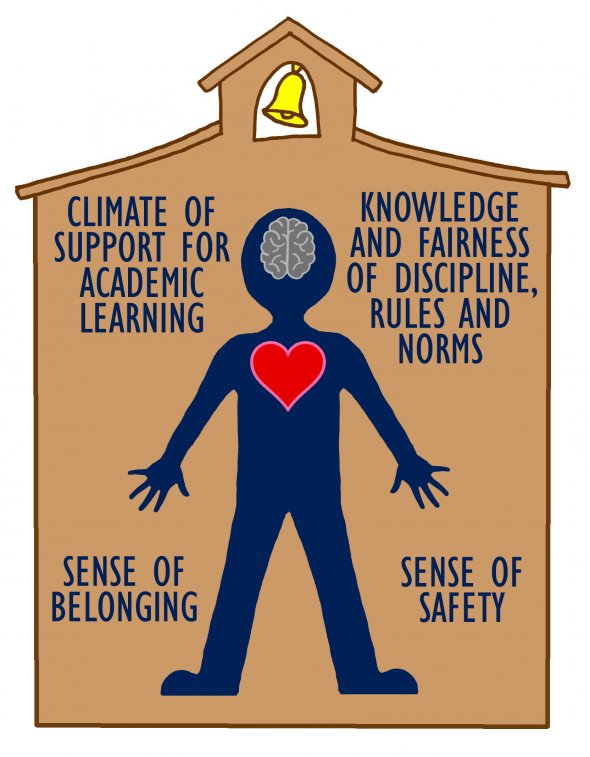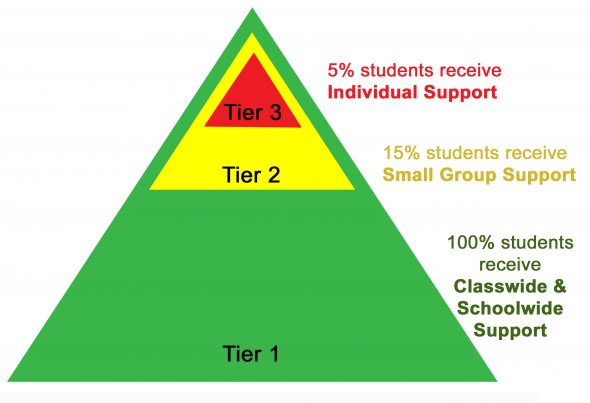
Supportive and inclusive climates and cultures in schools are vital to helping students become their best. SEL and school culture/climate are closely connected – how students manage emotions, build relationships, set and reach goals, and believe in themselves affects how a school feels, and vice versa. In addition to academic achievement, SEL and school culture/climate are important elements of the new School Quality Improvement Index.
Climate & Culture Constructs Link to this section
- Climate of Support for Academic Learning: the extent to which the climate is conducive to learning and that teachers use supportive practices, varied opportunities to demonstrate knowledge and skills, support for risk-taking and independent thinking. Respondents report that the atmosphere is conducive to dialog and questioning, academic challenge, and individual attention.
- Knowledge and Fairness of Discipline, Rules and Norms: the extent to which survey respondents report clearly communicated rules and expectations about student and adult behavior—especially regarding physical violence, verbal abuse or harassment, and teasing—clear and consistent enforcement, and norms for adult intervention.
- Sense of Belonging: whether students and staff have a positive sense of being accepted, valued, and included, by others (teachers and peers) in all school settings. Students and parents report feeling welcome at the school.
- Sense of Safety: whether students and adults report feeling safe at school and around school, including feeling safe from verbal abuse, teasing, or exclusion by others in the school.
(Adapted from "Using Surveys of Students’ Social-Emotional Learning and School Climate for Accountability and Continuous Improvement," 2017).
Strategies for Building Culture & Climate Link to this section
One-page documents with strategies and resources have been created, curated, and provided by TransformEd - an organization that endeavors to support educators and education systems in equipping students with the Mindsets, Essential Skills, and Habits they need to succeed in college, career, and life.

Positive Behavior Interventions & Supports (PBIS)
PBIS is a framework in which systems, data and practices are put in place for to create a positive, safe, consistent and predictable school environment. PBIS implementation is measured twice a year with a formative assessment, Tiered Fidelity Inventory: a valid, reliable, and efficient measure of the core features of PBIS.
Research on School Climate & Culture Link to this section
Decades of research show the importance of school climate and culture on student wellbeing and achievement, and on adult outcomes as well. Highlights:
A Review of School Climate Research (Thapa, Cohen, Guffey, and Higgins-D’Alessandro, 2013): Positive school climate is associated with a multitude of good outcomes, including higher student achievement, self-esteem, and self-concept; and lower rates of substance abuse, absenteeism, and physical and emotional violence (including bullying). Moreover, students in schools with more positive climates are more motivated to learn. Adults in schools with positive culture and climate also benefit, reporting higher resiliency, fewer threats of violence from students, and higher teacher retention.
The effects of school culture and climate on student achievement (MacNeil, Prater, and Busch, 2009): Teachers and students at schools with healthy school climate and culture are more motivated, and both learning and achievement is higher. The authors suggest that much of a principal's influence is on school climate and culture, and give suggestions for how school leaders can approach building positive climate.
Using surveys of students' social-emotional learning and school climate for accountability and continuous improvement (Hough, Kalogrides, and Loeb, 2017): The authors review SEL and Climate/Culture practices and measurements in SFUSD and four other CORE districts, analyze the measurement data, and compare them to other measures of school quality the districts have gathered to see the relationships between measures and explore what can be learned by using these measures in addition to more traditional measures of school and district quality.
This page was last updated on October 9, 2023

